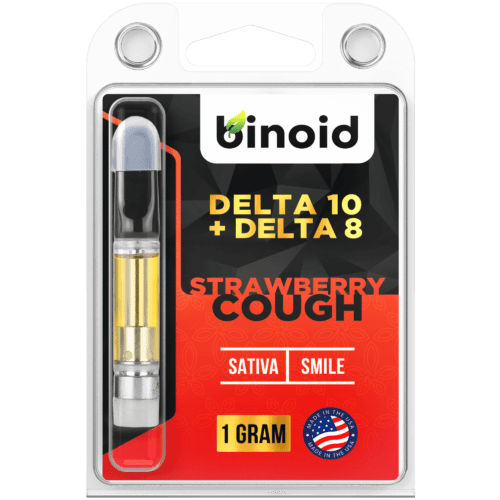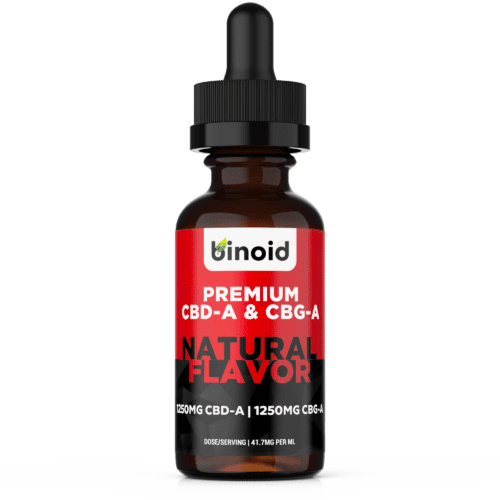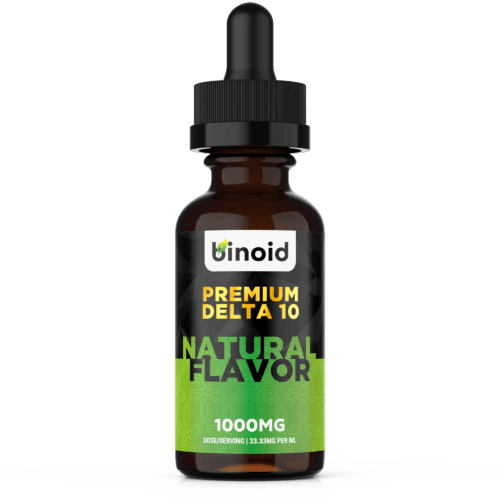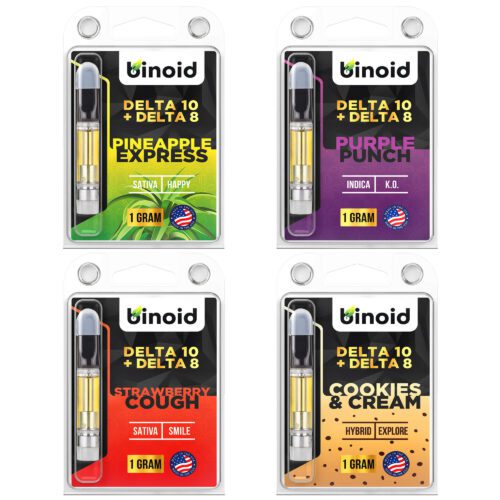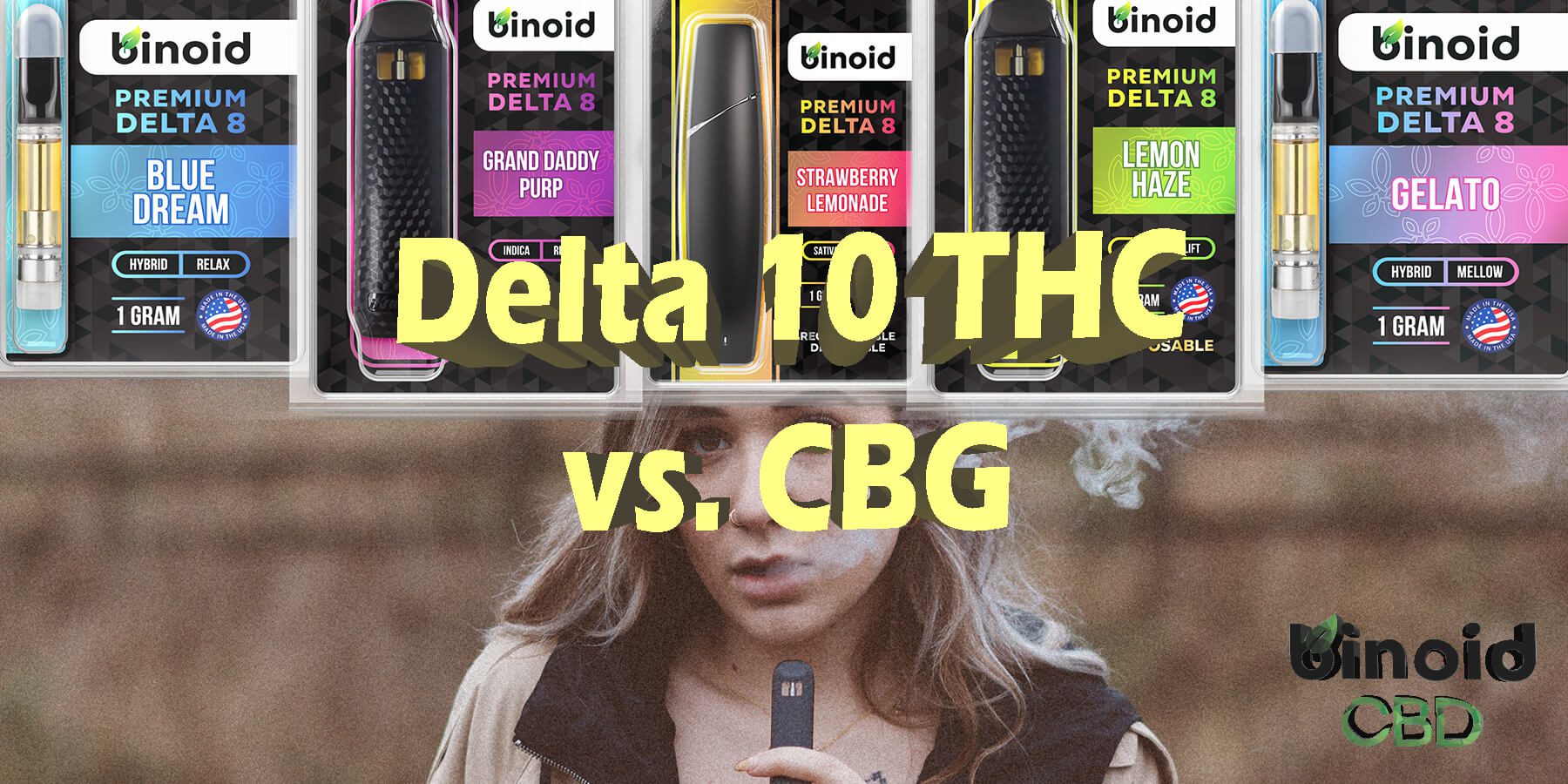
Delta 10 THC Vs. CBG
Delta 10 THC is only just starting to hit the market, offering yet another way to experience the properties of the hemp plant. Because you’ve almost definitely not yet tried delta 10 products, you are likely eager to understand what its effects are and how they differ from other compounds that come from hemp, specifically Cannabigerol (CBG).
CBG has existed on the market for a few years now, however the products have not picked up as much traction as other cannabinoids available such as CBN. However, we expect CBG to become more mainstream as users start to receive the benefits.
To buy Delta 10 THC Products Click Here
Delta 10 THC and CBG Similar Benefits
First, we just have to talk about what these two compounds have in common, as this can give you a good idea of what to expect when taking delta 10 and Delta 10 THC product, as someone who is already familiar with the properties of CBG.
#1: Both Delta 10 and CBG are Cannabinoids
They are essentially compounds, with the distinctive ability to bind to cannabinoid receptors throughout the body via the endocannabinoid system, to regulate specific bodily processes that play a role in homeostasis. Cannabinoids are unique in that no other compounds work directly with the endocannabinoid system. Because of how they are used by the endocannabinoid system, cannabinoids are considered to be nontoxic to the human body.
#2: Both Delta-10 and CBG are Found in the Hemp Plant
This important to keep in mind, as the hemp plant is federally legal, as are its individual derivatives with the exception of delta 9 THC. They exist in the buds of the female hemp plant, where we access all of the cannabinoids and terpenes associated with the plant. Since both of them have less than 0.3% Delta 9 THC, and are hemp-derived, they are technically legalized from the 2018 Farm Bill.
#3: Both CBG and Delta 10 THC Offer Various Methods of Delivery
Each are equally capable of delivering their effects through various forms of absorption. These cannabinoids can deliver their properties when taken sublingually, inhaled, ingested, or even applied topically. There are a few Delta 10 vape cartridges, gummies, and tinctures available. While CBG is more used in tinctures and topicals.
#4: CBG and Delta 10 Likely Share Anti-Inflammatory Activity
There are many CBG and Delta 10 THC benefits that are being discovered daily. One property of Cannabigerol that gets a lot of attention is its anti-inflammatory activity. CBG may suppress cytokine activity in order to lower both pain levels caused by inflammation, and symptoms of inflammatory conditions in the body. Delta 10 also likely has anti-inflammatory properties based on its similarities to other forms of tetrahydrocannabinol THC which are known to produce these effects.
#5: Delta 10 and CBG Each Could Have Effects on Pain
CBG has been studied for its potential analgesic properties which may offer relief from pain by interfering with the sensitivity of pain receptors belonging to the nervous system. Delta 9 THC and delta 8 THC both have this same quality, and so there is good reason to believe that delta 10 THC and delta 10 products do as well. In fact, analgesic activity seems to be something that many cannabinoids in the hemp plant can offer.
#5: CBG and Delta10 May Help Nausea
It is likely that both of these cannabinoids can play a role in managing nausea. Cannabinoids in general seem to be particularly useful to those who suffer from nausea, and Cannabigerol has been specifically noted for this quality. Meanwhile, THC is largely utilized for its anti-nausea effects, and we expect that delta 10 will be no exception.
#7: They are Minor Cannabinoids in the Hemp Plan
They do not occur abundantly in the plant material. Cannabidiol (CBD) is the dominant compound in hemp, and CBG and delta 10 exist in just a small portion of the plant’s chemical composition. Therefore, these cannabinoids must both be extracted and concentrated in order for us to experience their effects. However, CBG is named the “mother of all cannabinoids” for a reason. This is because CBG is the precursor to a lot of the main cannabinoids available, such as CBD and THC.
Differences Between CBG and Delta 10
Despite their many similarities, CBG and delta 10 are two different compounds that behave in different ways in the human body.
#1: Delta 10 is a Psychoactive Compound
Yes, delta 10 THC will get you high while CBG will not. However, the high is different from that of delta 9, and even delta 8. Delta10’s high, like that of delta-8, is noticeably milder than delta9’s, and while delta8 is more associated with calming effects, delta 10 seems to be more stimulating.
#2: Delta 10 is not Legal in Every State
It is important to know that delta 10 THC is not legal in all 50 states as eleven states have banned delta 10 entirely (you cannot legally purchase or sell it):
- Alaska
- Arizona
- Arkansas
- Colorado
- Delaware
- Idaho
- Iowa
- Mississippi
- Montana
- Rhode Island
- Utah
#3: Delta 10 Can Lead to a Positive Drug Test
Delta 10, like Delta 8 can cause you to fail a drug test, while Cannabigerol will not. Being a THC compound, delta 10 usage can show up on a urine test due to yielding the production of THC-COOH, an enzyme that breaks down THC, which presents itself in the urine. If tested regularly by your employer, you may have to avoid delta 10, as well as all other THC’s such as Delta 8 and Delta 9 of course.
#4: Delta 10 Offers Stronger Effects on Mood
Cannabigerol does not work as strongly with CB1 receptors in the brain that pertain to neurotransmitters. Many people who have tried delta 10 point out its mood-boosting effects, while CBG is more associated with anti-inflammatory activity as its primary use.
#5: Delta 10 Has Not Been Widely Studied, Yet
Delta 10 THC is such a new discovery that medical researchers have not yet been able to analyze its properties to prove its effects. CBG, meanwhile, has been studied over the years, and clinical studies are available which show us evidence of its properties. Delta 10 is predicted to be immensely popular, and so we can expect to see numerous studies in the future that tell us exactly how it works and what it can do for us.
#6: Delta 10 Has a Stronger Effect on the Central Nervous System
Delta 10 primarily works with the CB1 receptors in the body, which are cannabinoid receptors located throughout the nervous system. This is why its strongest effects have to do with mood, cognitive function, and energy levels. Meanwhile, CBG prefers CB2 receptors, which exist in the immune system and digestive system, which largely explains the potentially powerful anti-inflammatory activity of Cannabigerol when compared to other popular cannabinoids.
Can You Take CBG and Delta 10 Together?
One thing to keep in mind is that CBG and different delta 10 product types can be used together and can even work together synergistically to offer more potent and desirable effects. Both cannabinoids are relatively gentle on the body, and do not interact with one another in a negative way. We expect to see hemp formulas hit the market in the future that contain extracts of both of these compounds.
Which of the Two Cannabinoids is Right for Me?
The main takeaway is that delta 10 THC is a mildly psychoactive cannabinoid with potential uplifting and boosting properties. If that’s what you are trying to get out of your hemp experience, delta 10 is a great option to incorporate into your daily routine. So, consider giving delta-10 a try to see for yourself what it can offer you compared to other cannabinoids.
Overall, we always suggest buying from some of the best Hemp-based online stores such as Binoid for all your Delta 8, CBD, Delta 10, and CBG needs. Online Delta 8 stores such as Binoid CBD carry the best Delta-8 THC and Delta 10 brands, have many discounts all over their website, as well as fast and free shipping. It does not get much better than that! Binoid is a top Hemp website with more than 1000 reviews for a reason. We definitely suggest buying your Delta 10 THC and CBG there.

